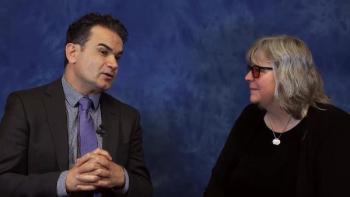
This peer-to-peer discussion reviews the current strategies for managing patients with melanoma, including screening and prognosis for high-risk patients and how to choose the best therapies to avoid toxicities and treatment resistance.

Your AI-Trained Oncology Knowledge Connection!


This peer-to-peer discussion reviews the current strategies for managing patients with melanoma, including screening and prognosis for high-risk patients and how to choose the best therapies to avoid toxicities and treatment resistance.

This video highlights results of a phase III randomized trial that tested chemotherapy plus bevacizumab in patients with recurrent or metastatic head and neck cancer.

This video examines a phase II trial that studied maintenance pembrolizumab in extensive-stage small-cell lung cancer.

This video reviews the use of endoscopic therapy for the management of Barrett esophagus and early esophageal cancer.

Patients may be able to shorten their chemotherapy course after surgery for lymph node–positive colon cancer, according to an analysis of six clinical trials.

A Web-based tool that enables patients to report their symptoms in real time, triggering alerts to clinicians, may improve survival.

A brief psychological intervention-Managing Cancer and Living Meaningfully (CALM)-significantly reduced distress in patients with advanced cancer.

Use of a psychological intervention-Conquer Fear-significantly reduced fear of cancer recurrence in cancer survivors in the first 6 months after treatment.

Widespread routine genomic testing is feasible in patients with advanced cancer, though there may be a clinical benefit to only a subset of patients.

Larotrectinib may provide consistent and durable antitumor activity in TRK fusion cancers, across a wide range of ages and tumor types.

Single radiation treatment may be as effective as a full week of radiation in patients with metastatic spinal canal compression.

A Web-based program is now providing new opportunities for alleviating stress and improving quality of life in cancer patients.

A new study is suggesting that a high percentage of testicular cancer survivors may suffer from hypogonadism.

As part of our coverage of the 2017 ASCO Annual Meeting, we discuss the impact of financial toxicity on cancer patients and their families.

Ahead of the 2017 ASCO Annual Meeting, we discuss eligibility criteria and participation in cancer clinical trials.

This slide show presents tricks for surviving and thriving at the ASCO Annual Meeting in Chicago. Everything from transportation, McCormick Place, planning your days, using social media, which sessions to attend, how to network, where to eat, and how to be a tourist in Chicago.

Patients with stage III colon cancer who maintained a healthy lifestyle had a reduced risk for death and a trend for a lower chance of recurrence.
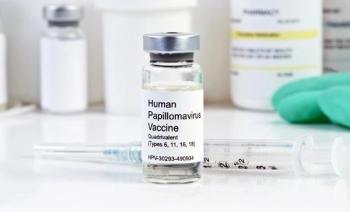
Prophylactic HPV vaccination significantly reduced vaccine-type oral HPV infections among young adults, according to the results of a cross-sectional study.

The addition of adjuvant oral chemotherapy with capecitabine extended the overall survival of patients with biliary cancers by a median of 15 months, according to the results of the BILCAP study.

Patients with stage III colon cancer who consumed at least two servings of nuts per week had significantly reduced risk for recurrence and death.

The implementation of the Affordable Care Act, which increased insurance coverage, was associated with an increase in the diagnosis of several screenable cancers at an earlier stage.
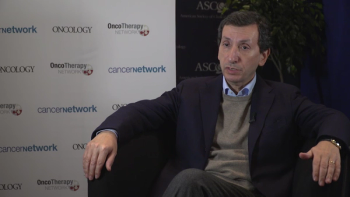
In this video we discuss the results of a phase III trial that studied upfront high-dose chemotherapy plus autologous stem cell transplantation (ASCT) compared to chemotherapy alone and bortezomib in newly diagnosed multiple myeloma.

Most metastatic cancer patients are still receiving aggressive methods of treatment near the end of life, and palliative/supportive measures are significantly underutilized.
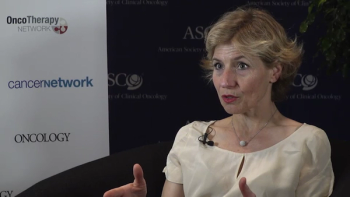
In this video we discuss 3-year results of the COMBI-d trial, which studied dabrafenib and trametinib in patients with unresectable or metastatic BRAF-mutated melanoma.
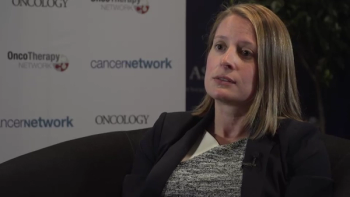
In this video we discuss the use of biomarker-guided treatment in phase I trials, which can yield high response rates.
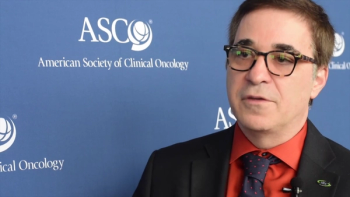
In this video we discuss promising results of the anti–PD-L1 agent avelumab in patients with metastatic Merkel cell carcinoma who had previously been treated with chemotherapy.

I hope to see many of the exciting agents presented this year become available and affordable for my patients. But when the miracle isn’t happening we have an obligation to talk it out and be candidly compassionate. We need to know when to put the pedal to the metal and when to hit the brake.

In this video we discuss 3-year overall survival data from the KEYNOTE-001 trial, which studied the anti–PD-1 antibody pembrolizumab in patients with advanced melanoma.

The MEK inhibitor binimetinib resulted in improved progression-free survival and response rates vs dacarbazine in patients with NRAS-mutated metastatic melanoma.
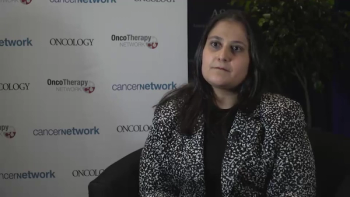
In this video we discuss how palliative care early on in the process of treating patients with cancer led to an improvement in depressive symptoms and quality of life among family caregivers.